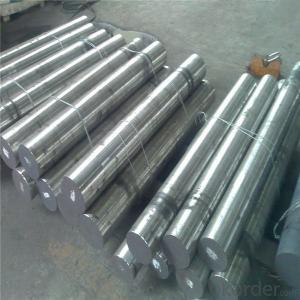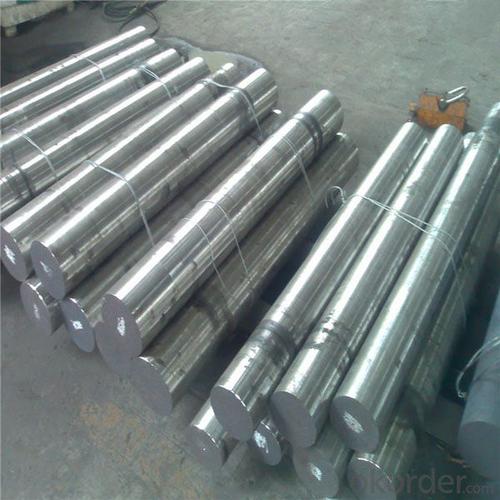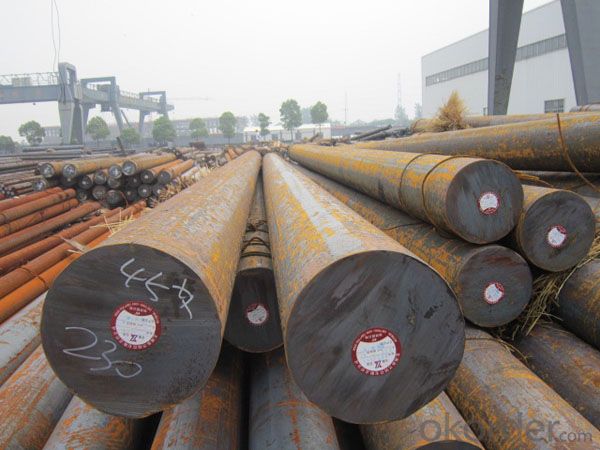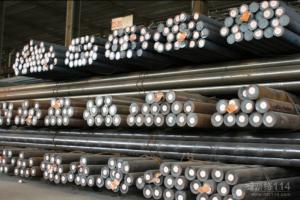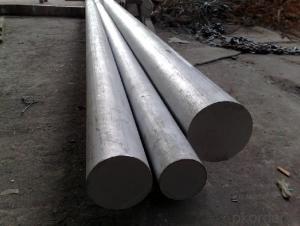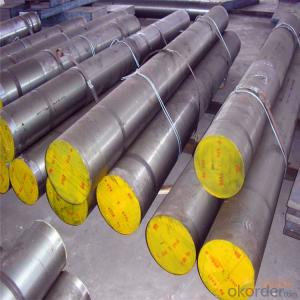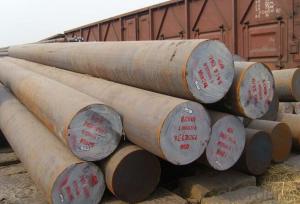Alloy Steel 52100 Bearing steel Special Steel
- Loading Port:
- China main port
- Payment Terms:
- TT OR LC
- Min Order Qty:
- 25 m.t.
- Supply Capability:
- 10000 m.t./month
OKorder Service Pledge
OKorder Financial Service
You Might Also Like
Specification
The details of our Steel
1. Produce Standard: as the GB, AISI, ASTM, SAE, EN, BS, DIN, JIS Industry Standard
2. Produce processes: Smelt Iron -EAF smelt Billet - ESR smelt Billet -Hot rolled or forged get the steel round bar and plate
3. Heat treatment:
Normalized / Annealed / Quenched+Tempered
4. Quality assurance:
All order we can received Third party inspection, You can let SGS, BV,.. and others test company test and inspect our products before Goods shipping.
Product information
Chemical Composition(GB)%
C | Si | Mn | Cr | Cu | S |
0.95-1.05 | 0.15-0.35 | 0.25-0.45 | 1.4-1.65 | ≤0.20 | ≤0.020 |
Heat Treatment
Item | Temperature ℃ | Hardness |
Anneal | 790-810 | 170-207HB |
Quenching | 830-860 | 62-66HRC |
Tempering | 150-180 | 61-66HRC |
Characterstics
1.Uniform hardness,Good abrasion resistance |
2.High contact fatigue resistance |
3.Cutting performance in general |
Applications: Used to make the load of the larger small cross-section conditioning and stress smaller large parts
Product show

Workshop show

- Q: Can special steel be used in the telecommunications industry?
- Yes, special steel can be used in the telecommunications industry. It is often used in the construction of telecommunication towers, antennas, and transmission lines due to its high strength, corrosion resistance, and durability.
- Q: What are the different types of wear-resistant steel?
- There are several different types of wear-resistant steel, including AR400, AR500, Hardox, and Domex. These steels are specifically designed to withstand abrasion and provide excellent durability in applications where materials are subjected to constant wear and impact.
- Q: How is electrical resistance steel used in heating elements?
- Electrical resistance steel is commonly used in heating elements due to its high resistivity and ability to withstand high temperatures. When an electric current passes through the steel, its resistance generates heat, allowing the heating element to efficiently convert electrical energy into heat energy. This makes it suitable for applications such as electric stoves, water heaters, and industrial furnaces.
- Q: What are the applications of special steel in the nuclear supply chain?
- Special steel has various applications in the nuclear supply chain due to its unique properties. It is commonly used in the construction of reactor vessels, steam generators, and fuel assemblies. Special steel is chosen for these applications because of its high strength, corrosion resistance, and ability to withstand extreme conditions such as high temperatures and radiation exposure. Additionally, special steel is used in the production of nuclear fuel, as it ensures the safe containment and transportation of radioactive materials. Overall, the use of special steel in the nuclear supply chain is crucial for the safe and efficient operation of nuclear power plants.
- Q: What are the common grades of special steel?
- The specific application and desired properties determine the varying common grades of special steel. Some frequently utilized grades are: 1. Stainless steel, an alloy resistant to corrosion containing a minimum of 10.5% chromium. Grades like 304, 316, and 410 possess exceptional corrosion resistance, high strength, and good formability, making them prevalent in various industries. 2. Tool steel, specifically designed for toolmaking, renowned for its high hardness, wear resistance, and toughness. Common grades such as D2, A2, O1, and S7 possess specific properties suitable for diverse applications. 3. High-speed steel (HSS), a type of tool steel retaining its hardness and cutting ability even at high temperatures. It frequently finds use in cutting tools like drills, end mills, and taps. M2, M35, and M42 are a few well-known HSS grades. 4. Alloy steel, made by incorporating different alloying elements to enhance specific properties. Grades like 4140, 4340, and 8620, known for their high strength, toughness, and wear resistance, are commonly utilized in industries such as automotive, aerospace, and machinery. 5. Spring steel, renowned for its ability to restore its original shape after bending or twisting. Grades like 1095 and 5160 are commonly employed in the manufacturing of springs, suspension components, and hand tools. These examples merely scratch the surface of the numerous available grades of special steel, each possessing unique properties and applications. It is vital to select the appropriate grade based on the specific requirements of the intended usage.
- Q: What are the different forms of special steel?
- There are several different forms of special steel, including stainless steel, tool steel, high-speed steel, alloy steel, and carbon steel. Each form has its own unique properties and characteristics that make it suitable for specific applications.
- Q: How does special steel contribute to sustainability?
- Special steel contributes to sustainability in several ways. Firstly, special steel is highly durable and has a long lifespan. This means that products made from special steel, such as buildings, bridges, and machinery, have a longer service life compared to other materials. This reduces the need for frequent replacements and repairs, thereby reducing the consumption of resources and energy required for manufacturing. Secondly, special steel is recyclable. At the end of its life cycle, it can be easily collected and recycled into new steel products without any loss of quality. This reduces the demand for new raw materials and minimizes the environmental impact caused by mining and extraction processes. Furthermore, special steel is known for its strength and lightweight properties. This allows for the design and construction of lighter and more energy-efficient structures and vehicles. For example, by using special steel in automobiles, the weight of the vehicle can be reduced, resulting in lower fuel consumption and greenhouse gas emissions. Additionally, the production of special steel has become more sustainable over the years. Steel manufacturers are adopting advanced technologies and processes to reduce energy consumption, emissions, and waste generation. This includes using energy-efficient furnaces, recycling waste heat, and implementing water management strategies. Overall, the use of special steel contributes to a more sustainable future by promoting durability, recyclability, energy efficiency, and reduced environmental impact.
- Q: What are the advantages of using special steel in specific applications?
- Using special steel in specific applications brings several advantages. Firstly, special steel outperforms regular steel in terms of strength and durability. It possesses higher tensile strength and better resistance to wear and tear, making it ideal for demanding industries like construction, automotive, and aerospace. This ensures that components made from special steel can withstand heavy loads, extreme temperatures, and harsh operating conditions without any deformation or failure. Secondly, special steel demonstrates exceptional corrosion resistance. It can effectively combat the detrimental effects of moisture, chemicals, and other corrosive elements, making it suitable for marine environments, chemical processing plants, and offshore structures. Special steel maintains its structural stability and integrity even when exposed to aggressive substances, which ultimately prolongs the lifespan of equipment and reduces maintenance costs. Another advantage of special steel lies in its versatility. It can be easily customized and tailored to meet the specific requirements of various applications. Special steel can be engineered to possess specific mechanical properties, such as hardness, toughness, or flexibility, depending on the desired application. This enables greater adaptability and empowers designers and engineers to create components that are optimized for their intended use. Furthermore, special steel often exhibits excellent heat resistance capabilities. It can endure high temperatures without sacrificing its mechanical properties, making it suitable for applications involving extreme heat, such as industrial furnaces, turbines, and engines. The steel's ability to withstand heat ensures that it retains its strength and shape, minimizing the risk of deformation or failure under elevated temperatures. Lastly, special steel offers superior machinability and weldability. It can be easily shaped, cut, and welded into intricate shapes and structures, facilitating efficient manufacturing processes and reducing production costs. Special steel's machinability also guarantees precise and accurate fabrication, resulting in high-quality components that meet stringent industry standards. In conclusion, special steel provides enhanced strength, durability, corrosion resistance, versatility, heat resistance, and excellent machinability, making it the preferred choice for various industries where reliability, performance, and longevity are crucial.
- Q: How does special steel contribute to the shipbuilding industry?
- The shipbuilding industry benefits greatly from the use of special steel in multiple ways. Firstly, special steel possesses increased strength and durability, making it an ideal material for constructing various ship components. These components, including the hull, decks, bulkheads, and other structural elements, must endure the harsh marine environment and heavy loads. Furthermore, special steel exhibits excellent resistance to both corrosion and abrasion, which is crucial for ships that constantly face exposure to saltwater and other corrosive agents. This ensures that the ship remains in good condition for a longer lifespan, resulting in reduced maintenance costs and improved operational efficiency. Additionally, special steel offers superior weldability and formability, allowing shipbuilders to easily create complex shapes and structures. This flexibility in design enables the construction of innovative and efficient ship designs, such as large container vessels, offshore oil rigs, and naval warships. Moreover, special steel is frequently used to manufacture critical components like propeller shafts, rudders, and engine parts. These components require high strength, toughness, and resistance to fatigue due to the extreme forces and vibrations they experience during operation. Special steel's unique properties ensure the reliability and performance of these crucial ship parts. Furthermore, special steel contributes to the shipbuilding industry by enabling the construction of lightweight ships without compromising strength and safety. This aids in reducing fuel consumption, leading to enhanced energy efficiency and lower greenhouse gas emissions. As environmental regulations become more stringent, special steel plays a vital role in making ships more sustainable and environmentally friendly. In conclusion, special steel is an essential material in the shipbuilding industry due to its exceptional strength, durability, corrosion resistance, weldability, formability, and lightweight properties. Its use not only ensures the safety and longevity of ships, but also facilitates the development of advanced ship designs and contributes to the overall sustainability of the industry.
- Q: How is special steel used in the production of cutting inserts?
- Special steel is used in the production of cutting inserts due to its unique properties, such as high hardness, wear resistance, and heat resistance. These qualities make it effective for withstanding the high temperatures and forces involved in cutting operations. Special steel cutting inserts are designed to cut through various materials, including metals, plastics, and composites, with precision and efficiency, making them essential tools in industries such as manufacturing, automotive, and aerospace.
Send your message to us
Alloy Steel 52100 Bearing steel Special Steel
- Loading Port:
- China main port
- Payment Terms:
- TT OR LC
- Min Order Qty:
- 25 m.t.
- Supply Capability:
- 10000 m.t./month
OKorder Service Pledge
OKorder Financial Service
Similar products
Hot products
Hot Searches
Related keywords
